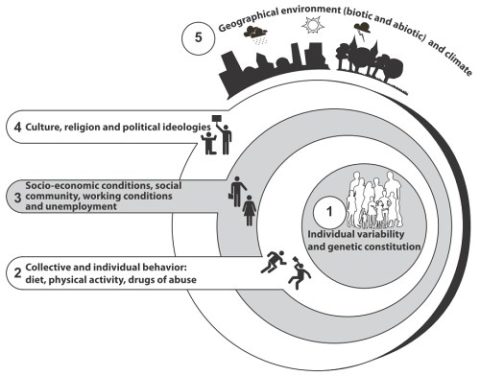 Live fast, die young. You’re a long time gone. Sleep when you’re dead. The hedonists mantras. Lifestyle choices whether in terms of food consumption, alcohol and drugs or sexual activity are down to the individual. Nannying by governments, who have their own mantras: Smoking Kills, Know your limits, Get your five-a-day, Use protection, etc, all costs money, is apparently ignored by most people, and probably has little effect on those lifestyle choices.
Live fast, die young. You’re a long time gone. Sleep when you’re dead. The hedonists mantras. Lifestyle choices whether in terms of food consumption, alcohol and drugs or sexual activity are down to the individual. Nannying by governments, who have their own mantras: Smoking Kills, Know your limits, Get your five-a-day, Use protection, etc, all costs money, is apparently ignored by most people, and probably has little effect on those lifestyle choices.
But, some researchers believe that the concept of freewill when it comes to smoking, drinking, poor eating habits and other health risks is not entirely independent of external forces. Claudio Ricciardi of the Department of Environment and Primary Prevention, at the Italian National Institute of Health, in Rome, goes so far as to say that these lifestyle choices are in fact “environmentally induced” and for that reason involve much more complex considerations of social responsibility and ethics than you might at first imagine.
Writing in IJEH (reference below), Ricciardi, a toxicologist by training and a bioethicist by practice, suggests that personal choices are defined by the culture around us, by the political mores, and local environmental conditions. Obvious perhaps, but given that many cultures emphasise the notion of personal freedoms and the individual’s right to choose how they live their life, one might assume that we are entirely free. He argues that the perception of specific risks varies from society to society and among cliques within those societies. Some groups are wont to ignore the risks of extreme sun exposure or heavy smoking while others will frown on such activities while gorging their prandial predilections, for instance.

Economics, politics and the law play an important role. If you’re priced out of a particular market you are unlikely to indulge so frequently in your baddest of habits while prohibition of your treat of choice might prevent you from ever partaking. Hobbies and activities, job (or lack thereof), economic conditions and educational level together with religious and political conditions, all contribute to lifestyle choices good or bad. Then there are your genes to consider…
“All too often,” says Ricciardi, “we witness, without being able to intervene, the growth of a ‘mean attitude’ which claims that smokers, obese and alcoholics should be punished, for their unhealthy lifestyles, with healthcare provided less urgently than that accorded to others. Their behaviours, considered antisocial, represent an added cost to the state and therefore should be punished rather than cured. No one asks, declares or explains the reasons for these unhealthy behaviours and lifestyles.”
I asked Ricciardi for an additional comment regarding my interpretation of his paper. Aside from confirming that I’d got my facts straight regarding what he published, he added that my the emphasis on the notion of “blaming the victims” is what he most wanted to communicate in his paper. “Blaming the victims is actually a very interesting reversal situation,” he told me. One might suppose that it occurs in several other social contexts, such as family and interpersonal relationships and even in historical situations such as The Holocaust. He also pointed out that the issue of genetics is “definitively part of the complexity of the human biological reality,” but he adds that, “its role in developing different lifestyles is limited in comparison to that of the socio-economic components.”
![]() Claudio Ricciardi (2011). Induced harmful lifestyles and healthy choices Int. J. Environ. Health, 5 (3), 262-273
Claudio Ricciardi (2011). Induced harmful lifestyles and healthy choices Int. J. Environ. Health, 5 (3), 262-273
Graphic by Cosimo Marino Curianò